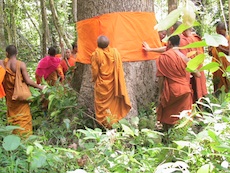| |
|
 |
The Quiet Revolution
March 1, 2013:
 |
 |
 |
In Cambodia's forests Buddhist monks ordained trees to prevent destructive logging. |
Resurgence, like its editor/founder Satish Kumar, has been a significant voice on environmental issues for many years and the March/April 2013 edition celebrates the magazine's 40th anniversary as well as its recent merger with The Ecologist.
To mark the occasion ARC Secretary General Martin Palmer has contributed an article taking a reflective look back at the history of the engagement of faith groups in environmentalism since the famous Assissi Declarations of 1986.
Palmer shows why religions are ethically bound to protect nature and the planet as well as looking at their enormous organisational power as forces for social and economic change. The article's title The Quiet Revolution expresses the way that mainstream conservationists have generally failed to notice the emergence of religions as major environmental agents.
That situation is changing, however, and it quotes Carl Pope, chair of the US conservation group The Sierra Club, as saying: "I was part of the generation that made the choice - the horrendous strategic blunder - of situating ourselves outside the institutions of faith. Now we have a chance to repent of, and reform from, that error."
Here is an extract:
I recently had to help a group of young people, mostly from the Occupy movement worldwide, think through how to hold a conference without falling into the usual trap at such events of meaningless language and posturing. We were particularly vexed by the issue of language and the now almost complete uselessness of terms such as ‘sustainable development’ or the deeply anthropocentric materialist term ‘ecosystem deliverables’.
So we came up with an idea. Many of you will know the BBC Radio programme Just a Minute, where people have to speak for one minute on a given subject without repetition, deviation or hesitation. So we agreed that this would be how we would run the conference. Nobody would be able to use the same term twice in any one talk, speech, report back to a plenary or any of the other usual things. The challenge of having to find other words to express ideas we no longer actually think about – such as the two cited above – would be fascinating to watch.
I mention this because to a very great extent the conservation/ecology world has created a language, even a mythology, that largely excludes people rather than including them. And this is a major reason why we are not as successful as we once thought we might be.
Continue reading here.
Or download as a pdf: Part one and
Part two.
Visit the Resurgence & Ecologist website here.
|
 |
 |
|
|
|
|
|
 |
How ARC was formed
From its beginnings in Assisi in 1986, and later as a separate charity in 1995, how ARC grew into a worldwide network |
 |
ARC and the Faiths
Faith communities are working in countless ways to care for the environment. This section outlines the basics of each faith’s history, beliefs and teachings on ecology. |
 |
February 7, 2013:
Religions belong at the forefront of environment and wildlife protection
The crucial role played by faith leaders in protecting wildlife, biodiversity and the environment has been recognised in a major interview in New Scientist magazine. |
 |
 |
|
|

